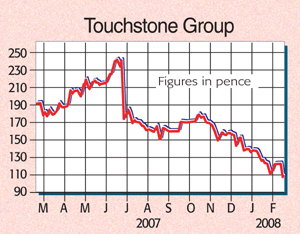
Due to current stockmarket jitters, many fund managers have bid-up perceived “safe haven” stocks, such as utilities, where earnings visibility is strong. Fixed-line telecoms operators generate similarly predictable income streams as their customers rely on round-the-clock broadband, data and IT support. So why has this telecoms stock tumbled?
BT (BT), rated a BUY by Investec Securities
Given its defensive qualities, it seems odd that the City has recently hung up on BT, driving its shares down by around 30% from last summer’s high of 336p. This looks too harsh.
Firstly, BT has successfully transformed itself from a former state monopoly providing phone-calls into a high-tech provider of broadband, data, IT and telecommunications services. Its third-quarter results earlier this month marginally missed City estimates, but total turnover still rose 1%, with sales of these “new wave” products up 7% amid robust demand for IT (up 9%) and broad band (up 6%). I think BT has reached a tipping point – this rapid growth (39% of turnover) will now more than compensate for the decline in its traditional business.
BT is also investing £10bn in rolling out its 21st-century network, which should deliver vast economies of scale and push the group to the forefront of the industry. By replacing 16 outdated fixed-line networks across 160 countries with one all-singing, all-dancing system, huge operating and capital expense savings should be achieved. For example, BT is currently spending 16% of revenues on fixed assets versus the EU average of 10% – a position that should unwind once the network is fully lit-up in 2011.
Lastly there’s the beaten-up valuation. BT has now delivered 23 quarters in a row of underlying earnings growth and is forecast to achieve 2007/2008 revenues and underlying earnings per share of £20.7bn and 23p respectively, rising to £21.1bn and 24.3p in 2008/2009. That puts the stock on undemanding p/e ratios of 10.2 and 9.7. It also pays a healthy dividend yield of 6.6% (or 15.4p), which should appeal to income-seeking investors. The outlook is also positive: chief executive Ben Verwaayen says that he expects growth in earnings and dividends to continue.
So why the City’s pessimism? There are three main fears. First, there are worries about the intense competition in the UK broadband sector from rivals Sky and Carphone Warehouse. Then there are concerns about the sustainability of the hefty dividend. Thirdly, the City is worried about the impact of equity turmoil on the value of BT’s enormous £40bn pension scheme.
These are real concerns, but I suspect they’ve been over-played. As the UK’s top broadband provider, and with the new network set to come online shortly, BT will not only be the lowest-cost operator, but should also be able to offer some of the most innovative products on the market. And I suspect that pricing across the industry has stabilised, so profitability should pick up as customer-acquisition costs fall.
As for the dividend, pundits point to the £10.2bn of net debt and the thin cover of 1.5 times earnings. But this ignores the enormous cash savings that will come from the new network. Clearly, there is a danger that BT’s pension scheme will be hit by market volatility, but it was in surplus by £0.7bn in December and has cut its exposure to equities from 50% to 40% over the past year. With the regulatory environment moving in BT’s favour too, I advise tucking some shares away for the medium term. Full-year results are out on 15 May.
Recommendation: BUY at 228.25p
• Paul Hill also writes a weekly share-tipping newsletter, Precision Guided Investments